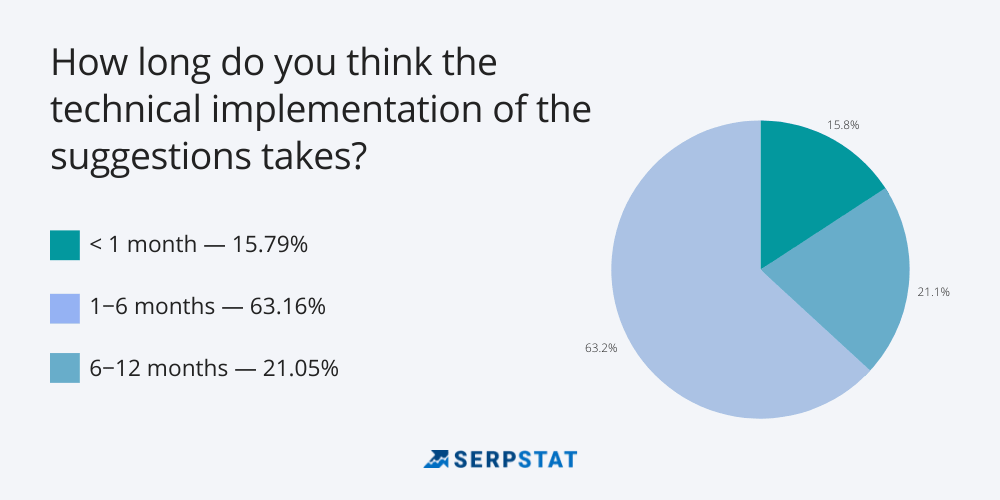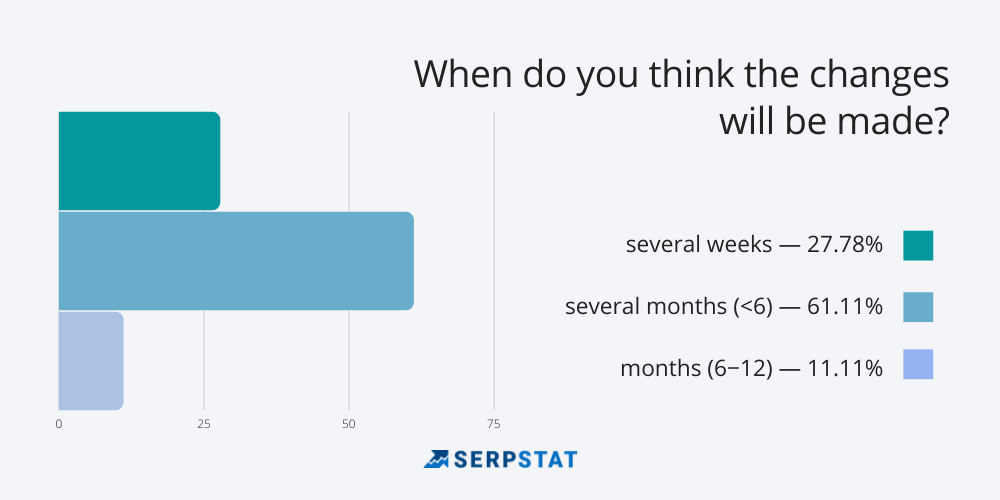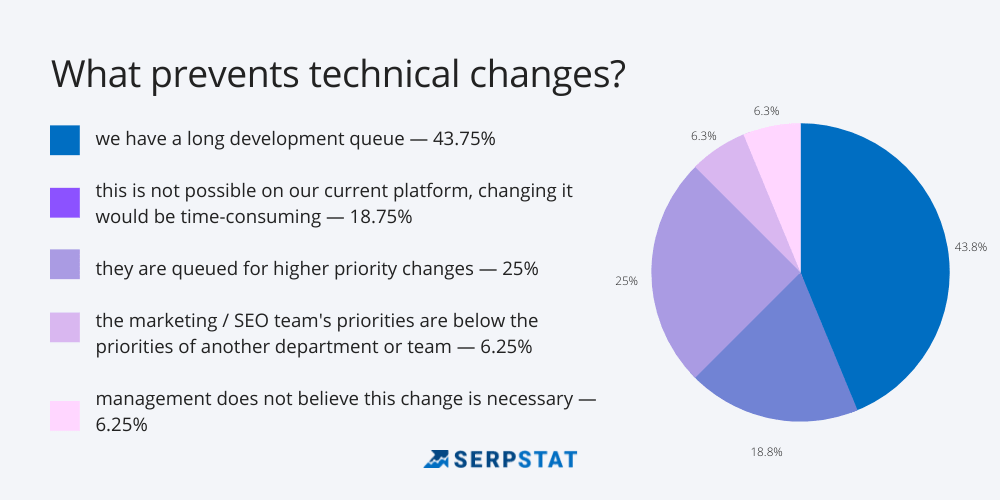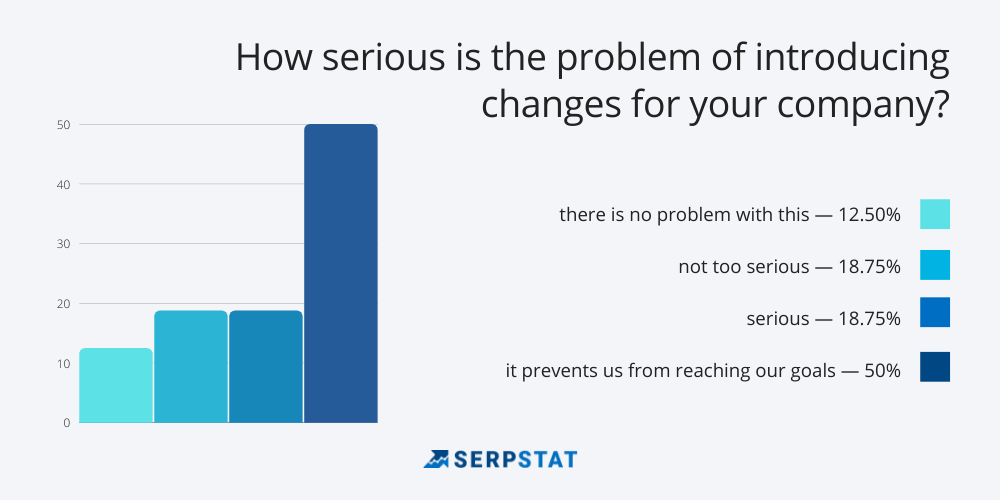Start Exploring Keyword Ideas
Use Serpstat to find the best keywords for your website
How Long Big-Company SEOs Wait For Their Important Technical Changes: Serpstat Research

2. What are the difficulties with the implementation of edits on large projects?
2.1 What technical changes are you implementing on your site?
2.2 How much, in your opinion, does the technical implementation of the edits that you suggest take?
2.3 How long do you think it will take to implement the changes that you suggest?
2.4 What, as a rule, prevents technical changes?
2.5 How serious is the problem of introducing changes for your company?
2.6 How would you advise drawing the team's attention to solving the problem of investing in SEO projects?
3. Common problems in the technical implementation of edits: expert opinion
4. Results: 10 recommendations for speeding up the process of implementing edits from SEO specialists working on large projects
About the survey
If you work in such an environment, you probably won't be surprised by these numbers. Unfortunately, this is a widespread problem, and it hinders the achievement of the fundamental goals of large companies.
We decided to survey SEOs to understand the problem better and get expert recommendations on how to solve it.
What are the difficulties with the implementation of edits on large projects?
What technical changes are you implementing on your site?
1. Simplifying and improving the service for users - these are tasks for the user's account, adding and displaying important information for customers (for example, work experience, surname), navigation. Some of them can only indirectly affect SEO, but a user who was comfortable working with the service and found what he was looking for will return if a similar task arises. In-house's SEO project is always more than the generation of landing pages, metadata, and technical audits.
2. Edits after site audit: deleting 400 and 300 errors, closing pages, etc.
3. Correction of errors that Google Search Console sees and work with excluded pages from the development side (I take this point separately from the technical analysis since we work with this constantly and tasks are set as soon as the problem appears).
The rest of the tasks are experimental.
In my technical SEO audits, I will make sure I understand who is implementing and their level of expertise.
If something is an issue I don't hesitate to mention it. There is no sense in making something a priority if you know it will never be implemented though.
How much, in your opinion, does the technical implementation of the edits that you suggest take?

How long do you think it will really take to implement the changes that you suggest?

1. Bugs (especially if it is a user request, or the error may interfere with the regular interaction with our service). Tasks with the highest priority go to work immediately; as a rule, they are fixed on the same day or the next.
2. Technical errors take a week to several months to implement from the moment we set the task (depending on the tasks in the queue and the number of bugs arising along the way).
3. Service improvements and experiments are pre-evaluated and prioritized. For example, if we can solve the issue with one line of code or it is an important improvement that will be 99.9% useful, the implementation takes up to a month. On the other hand, suppose the task is complex, and it is impossible to assess the benefits unequivocally. In that case, we put it in the backlog in order of priority (implementing such tasks takes from several months to six months).
4. There is also a label "Urgent". Tasks with this label are done out of turn.
For most tasks, you can estimate how long the implementation will take, and according to the place in the queue, this task will go into work. If you haven't encountered the task before, we ask the developers to estimate the time to complete it.
What, as a rule, prevents technical changes?
Long development queue - 43.75%;
Edits are in the queue for changes with a higher priority - 25%;
Making changes "is not possible" on the current platform - 18.75%.

How serious is the problem of introducing changes for your company?

Data-driven, experimental approach - basically, you identify the key challenges or goals the business has for the next year or few years (usually CEOs and executive teams set these out) that digital marketing can positively impact. Then make a case for how much you believe it can affect the goal if given a big budget and the freedom to do the work. But, don't pitch that. Say, instead "make me prove it to us all. Let us run a test with a small amount of budget and a few changes, and if we see X amount of impact within 6 months after releasing, then approve the full project." This often creates a lot of goodwill and trust, and lets everyone know that you want the numbers to validate your work - execs tend to love that, and they can sell it to their superiors, too. Even engineering teams like this approach, since they will only be asked for a small amount of resources upfront and then if they do what you ask and it doesn't work, they won't be asked to do more.
Competitive-jealousy approach - this is where you show off the performance of competitors in search results and in search traffic. Sometimes, seeing leading competitors ahead of you will trigger a "what do you need to beat them?" mentality in execs that wasn't previously there.
You can try combining these, too :)
Common problems in the technical implementation of edits: expert opinion
Here are a few things we've done to improve implementation at large companies dramatically:
1. Go to the source. Yes, developers will do the work, but they rarely prioritize projects at larger companies. So find out who does, and get their buy-in.
2. Align with their sprints. Find out how your customers' dev team works, and schedule your recommendations within their workflow. Do they have 3-week sprints? Quarterly deliverables? Do they work on one project at a time? If you can alight your projects with theirs and get time on the books your work will be prioritized with theirs.
3. Get an executive sponsor. The reason your rec's don't get implemented is often that an executive steps in and prioritizes an internal project. It's also much easier to say "no" to an SEO company than your boss's boss. Executives can quickly clear the runway to make sure your work is top priority.
4. Align your rec's with your customers' current business goals. If their top priority is a big project, then explain how your rec's will drive better outcomes for it.
In terms of timelines, usually within 3 – 6 months due to the large scope of changes on complex enterprise sites.
Developers often delay SEO tasks because they are not familiar with SEO and do not understand its value. Here the SEO's task is to convey this value to the team together with the PO/PM of the product. A manager's participation is highly desirable, as it is the manager who can set priorities in development at the project level.
Ideally, all teams should understand the role of marketing in how successful the product will be (as well as understand the importance of development or testing) and took tasks from marketers as willingly as they take new features into development. If the task cannot be done exactly according to the description because the platform does not allow it, it is better to try to find a compromise solution together with the SEO that will work.
To solve this problem, you must plan the project (website) promotion strategy for at least 6 months.
What will we get from the strategy?
- competitive analysis;
- work plan (divided into tasks);
- indicative budgets;
- goals (traffic/conversions);
To correctly form priorities, it is necessary to set up the appropriate processes with the development department. As a basis, I would recommend taking the PIE Framework, which Chris Howard developed.
We took 3 main criteria for this framework and added one depending on the specifics of our company with a rating scale from 1 to 10.
1. Potential (Influence) - means how much the implemented task will affect the project . (landing page, category, entire site) where 1 - slightly affect, and 10 - affect the whole site (for example, redesign).
2. Importance - means how much of the traffic we will affect when we complete the task. Where 1 = insignificant part, 10 - significant part.
3. Ease - means ease of implementation - for example, change the color of a button or make edits in the footer where 1 is easy and quick to implement, and 10 is hard.
4. Priority - this criterion is taken following the specifics of the department. Since there are many projects, I recommend giving them a priority within the company. For example, there are 9 projects in your company, 3 of them bring the bulk of the profit, respectively, we will assign them the highest priority, and all the rest below.
When setting tasks for a project, employees evaluate them. For example, Task 1:
Potentiail (Influence) = 10
Importance = 2
Ease = 1
Priority = 5.
The PIE Score of this issue = (10 + 2 + 1 + 5) / 4 = 4.5. That is, the development department already sees how important the task is.
With many tasks, these estimates will help correctly form the backlog and take tasks into work gradually.
So, what we get in the end: an SEO specialist has a task plan, which he formed following the strategy. He assesses these tasks when assigning tasks to the development department, and the development department takes on tasks with a high priority in the first place. Thus, the most basic tasks are solved in the first place).
Of course, SEO goals and their achievement cannot be independent of the company's global marketing goals, but it is still worth setting optimization goals above those required at a given point in time. It is critical to build a structured workflow, first in the team and then in the company. I like the esports niche as it is dynamic and far from simple as it might seem at first glance. During my work in the WePlay Esports holding, I concluded that it is essential not to use templates in my work, but to experiment and evaluate work much more often than management requires.
10 recommendations for speeding up the process of implementing edits from SEO specialists working on large projects
Speed up your search marketing growth with Serpstat!
Keyword and backlink opportunities, competitors' online strategy, daily rankings and SEO-related issues.
A pack of tools for reducing your time on SEO tasks.
Discover More SEO Tools
Backlink Cheсker
Backlinks checking for any site. Increase the power of your backlink profile
API for SEO
Search big data and get results using SEO API
Competitor Website Analytics
Complete analysis of competitors' websites for SEO and PPC
Keyword Rank Checker
Google Keyword Rankings Checker - gain valuable insights into your website's search engine rankings
Recommended posts
Cases, life hacks, researches, and useful articles
Don’t you have time to follow the news? No worries! Our editor will choose articles that will definitely help you with your work. Join our cozy community :)
By clicking the button, you agree to our privacy policy.











